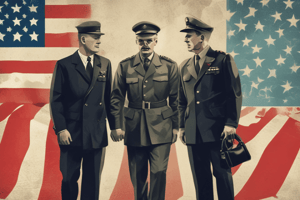Podcast
Questions and Answers
Why was the Cold War called the Cold War?
Why was the Cold War called the Cold War?
It was called the Cold War because there was no actual fighting; the Soviet Union and the United States were just creating and testing nuclear weapons.
What is the United Nations?
What is the United Nations?
An international organization founded in 1945 to promote world peace and cooperation, replacing the League of Nations.
What does 'ideological' mean?
What does 'ideological' mean?
A system of ideas and ideals, especially one that forms the basis of economic or political theory and policy.
Who was John Locke?
Who was John Locke?
What did Karl Marx propose?
What did Karl Marx propose?
What was the Yalta Conference?
What was the Yalta Conference?
Who was George Kennan?
Who was George Kennan?
What was the Long Telegram?
What was the Long Telegram?
What did Andrew Alexander say about the Soviets?
What did Andrew Alexander say about the Soviets?
What did Stalin's speech in 1946 imply?
What did Stalin's speech in 1946 imply?
What was Time Magazine's interpretation of Stalin's speech?
What was Time Magazine's interpretation of Stalin's speech?
What did William O'Douglas claim about Stalin's speech?
What did William O'Douglas claim about Stalin's speech?
What is the Iron Curtain?
What is the Iron Curtain?
Who was Harry S. Truman?
Who was Harry S. Truman?
What is the Truman Doctrine?
What is the Truman Doctrine?
What is meant by Containment?
What is meant by Containment?
What assistance did Truman seek for Greece and Turkey?
What assistance did Truman seek for Greece and Turkey?
What was the Marshall Plan?
What was the Marshall Plan?
What happened during the Berlin Blockade/Airlift?
What happened during the Berlin Blockade/Airlift?
What characterized the 1948 election?
What characterized the 1948 election?
Flashcards are hidden until you start studying
Study Notes
Cold War Overview
- The term "Cold War" refers to the lack of direct military conflict between the U.S. and the Soviet Union, marked instead by nuclear arms races and ideological competition.
United Nations
- Established in 1945 to encourage international peace and cooperation, replacing the earlier League of Nations.
Ideological Foundations
- Ideology encompasses systems of ideas influencing political and economic policies.
Influential Philosophers
- John Locke emphasized the "social contract," positing government derives authority from the people's consent and that individuals possess natural rights to life, liberty, and property.
- Karl Marx proposed communism, asserting class struggle leads to societal evolution towards a classless society.
Yalta Conference
- Held in February 1945, leaders Roosevelt, Churchill, and Stalin discussed final war strategies, post-war divisions of Germany, and the establishment of the United Nations.
- Germany was divided into four occupation zones, with Russia committing to join the war against Japan for territorial concessions.
Key Figures in the Cold War
- George Kennan, recognized as the creator of the containment policy, believed the Soviet Union posed a significant threat that needed to be countered.
- Andrew Alexander contended that the Soviets did not present a danger.
Cold War Communications
- The Long Telegram, written by Kennan in 1946, urged President Truman to contain Communist expansion, suggesting that isolating Soviets would eventually weaken Communism.
- Stalin's 1946 speech implied a belief that capitalism was doomed and predicted a conflict between capitalist nations.
Interpretations of Stalin's Speech
- Time Magazine interpreted it as a declaration of attack against the U.S.
- William O'Douglas referred to it as a proclamation of World War III.
Iron Curtain
- Winston Churchill coined the term to describe the divide between the Soviet-controlled East and the U.S.-led West.
Harry S. Truman
- The 33rd U.S. president, assumed office after Roosevelt’s death in 1945, overseeing the end of WWII and initiating significant foreign policies, including the Dean of the atomic bomb.
Truman Doctrine
- Announced in 1947, aimed to support nations threatened by communism, starting with military and economic aid to Greece and Turkey.
Containment Policy
- Formulated by Truman, U.S. foreign policy sought to prevent further Soviet expansion through alliances and support for vulnerable countries.
Financial Aid to Greece and Turkey
- Truman requested $400 million to bolster Greece and Turkey against communist influences.
Marshall Plan
- Proposed in 1947, it provided extensive American economic aid to rebuild European economies post-WWII to thwart the spread of Communism.
Berlin Blockade and Airlift
- In 1948, the Soviet Union blockaded Berlin, prompting the U.S. to initiate an airlift to supply the city with essential goods.
1948 Presidential Election
- Featured candidates: Republican Dewey, who had no significant Cold War policies; Progressive Wallace; and Dixiecrat Thurmond, advocating state rights.
- Truman's victory surprised many due to his effective communication and campaign strategy.
Studying That Suits You
Use AI to generate personalized quizzes and flashcards to suit your learning preferences.




